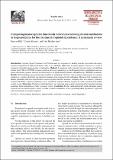Files in this item
Comparing neurocognitive function in individuals receiving chronic methadone or buprenorphine for the treatment of opioid dependence : a systematic review
Item metadata
| dc.contributor.author | Hill, Duncan | |
| dc.contributor.author | Garner, Daniel | |
| dc.contributor.author | Baldacchino, Alexander Mario | |
| dc.date.accessioned | 2018-10-08T15:30:09Z | |
| dc.date.available | 2018-10-08T15:30:09Z | |
| dc.date.issued | 2018-10 | |
| dc.identifier | 256147292 | |
| dc.identifier | 3d3ecbf6-c70c-4041-b5c2-08ffca9bfe6f | |
| dc.identifier | 85055557507 | |
| dc.identifier.citation | Hill , D , Garner , D & Baldacchino , A M 2018 , ' Comparing neurocognitive function in individuals receiving chronic methadone or buprenorphine for the treatment of opioid dependence : a systematic review ' , Heroin Addiction and Related Clinical Problems , vol. 20 , no. 5 , pp. 35-49 . | en |
| dc.identifier.issn | 1592-1638 | |
| dc.identifier.other | ORCID: /0000-0002-5388-7376/work/60196784 | |
| dc.identifier.uri | https://hdl.handle.net/10023/16170 | |
| dc.description.abstract | Introduction: Agonist Opioid Treatments (AOT) have been, in comparison to healthy controls, associated with neurocognitive impairment in different domains. This review identifies differences in neurocognitive function as a result of treatment with either buprenorphine or methadone. Method: A qualitative and systematic literature review of published articles from 1946 to 29/2/2016 on neurocognitive function of patients prescribed buprenorphine or methadone and compared with healthy patients utilising the Meta-analysis of Observational Studies in Epidemiology (MOOSE) guidelines. Results: The limited data demonstrate buprenorphine as presenting with fewer neurocognitive impairments, in cognitiveimpulsivity, cognitive flexibility and attention domains when compared with methadone. However both treatments modalities presented with more impairments in neurocognitive function domains, including short term memory, attention, cognitive flexibility, cognitive impulsivity, motor impulsivity and non planning impulsivity, when compared with healthy control groups. Discussion: The lack of published papers in comparing neurocognitive impairment between the treatment modalities limit interpretation of this systematic review. Conclusion: Further methodologically rigid and higher qualityresearch into the neurocognitive effects of these treatment modalities in the opioid dependent populations, especially when in treatment, is urgently required. | |
| dc.format.extent | 15 | |
| dc.format.extent | 278860 | |
| dc.language.iso | eng | |
| dc.relation.ispartof | Heroin Addiction and Related Clinical Problems | en |
| dc.subject | Neurodegenerative impairment | en |
| dc.subject | Buprenorphine | en |
| dc.subject | Methadone | en |
| dc.subject | Treatment | en |
| dc.subject | Opioid dependence | en |
| dc.subject | RC0321 Neuroscience. Biological psychiatry. Neuropsychiatry | en |
| dc.subject | T-NDAS | en |
| dc.subject.lcc | RC0321 | en |
| dc.title | Comparing neurocognitive function in individuals receiving chronic methadone or buprenorphine for the treatment of opioid dependence : a systematic review | en |
| dc.type | Journal article | en |
| dc.contributor.institution | University of St Andrews. School of Medicine | en |
| dc.contributor.institution | University of St Andrews. Population and Behavioural Science Division | en |
| dc.contributor.institution | University of St Andrews. Centre for Minorities Research (CMR) | en |
| dc.description.status | Peer reviewed | en |
| dc.identifier.url | http://www.heroinaddictionrelatedclinicalproblems.org/harcp-archives.php | en |
This item appears in the following Collection(s)
Items in the St Andrews Research Repository are protected by copyright, with all rights reserved, unless otherwise indicated.

